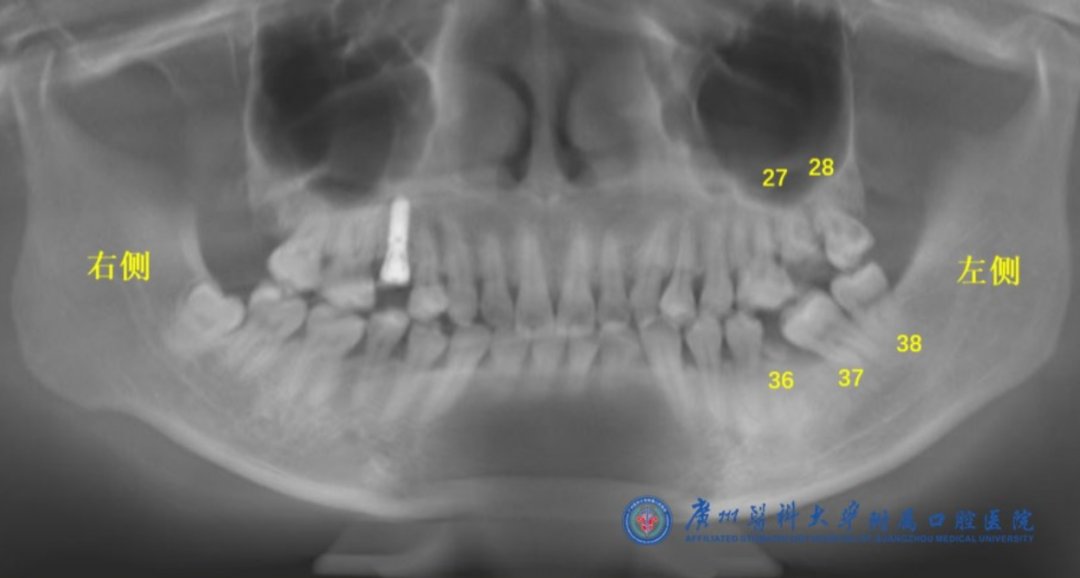Toothache is not a disease, it hurts really badly
Presumably many people have tasted this kind of taste
So many people choose to put their wisdom teeth
Removal
However, experts say
There are times when wisdom teeth can be helpful!
Wisdom teeth are long and not pulled out
It came in handy
“Doctor, my tooth is broken, do I need a dental implant?”
“You don’t need to!” After the doctor finished speaking, he pulled his wisdom tooth…
p>
This conversation happened two months ago. Mr. Zhang from Guangzhou came to the Department of Oral and Maxillofacial Surgery, Yuexiu District, Guangzhou Medical University Affiliated Stomatological Hospital because of a broken tooth. Seeing the doctor, “I was so excited when I watched the women’s football game some time ago. I accidentally hit my tooth when I ate peanuts. Who would have guessed that the tooth would actually fall out. It hurts every time I bite something, and it hurts to speak. I didn’t eat well, and I couldn’t sleep well.”
After examination by the visiting doctor, it was found that the collapsed lower right posterior tooth was a “senior tooth decay” that had “rotten through the bottom”, In addition to biting a hard object, more than half of the teeth are split, which cannot be saved by treatment and can only be extracted.
Fortunately, the doctor found that Mr. Zhang has a wisdom tooth that matches the shape of the rotten tooth, and can do autologous tooth transplantation – after the rotten tooth is extracted, the wisdom tooth will be transplanted into the extraction socket to replace the original one. Grinding teeth, the same surgery can repair missing teeth.
The doctor introduced that generally after wisdom teeth are extracted, they become medical waste and are disposed of, while autologous tooth transplantation technology uses wisdom teeth as a natural and valuable resource for repairing missing teeth, realizing “turning waste into treasure” . The successfully transplanted tooth can achieve the healing of the periodontal ligament, and the patient finally obtains a real tooth, which preserves the normal periodontal tissue and tooth proprioception, which cannot be achieved by other existing restoration methods.
Mr. Zhang’s transplant operation went well, and new bone has formed around the wisdom teeth after transplantation. In this way, Mr. Zhang obtained a tooth that is both an “old tooth” and a “new tooth”. Moreover, it is not a denture, it is completely his real teeth.
I can finally eat normally, Mr. Zhang is very happy.
Wisdom teeth may be the “strongest substitute”
Coincidentally, the doctor introduced another case——
Chen The woman’s left upper and lower jaws had rotten 3 large teeth (No. 27, 28, 36) and two severely inclined teeth (No. 37, 38) (as shown in the picture below). According to the classic implant restoration plan, all 5 teeth need to be extracted, and then 3 teeth will be implanted (1 in number 27, 2 in number 36 and 37).

Ms. Chen’s three rotten teeth (No. 27, 28, 36) and two inclined teeth (No. 37, 38)
“We developed a ‘three-step’ autologous tooth transplantation plan for patients after comprehensive evaluation and design,” said Director Zhou Libin.
1. 3 rotten teeth (No. 27, 28 and 36) that could not be preserved were extracted, and the left lower wisdom tooth 38 was transplanted to the position of the maxillary 27 teeth at the same time.
2. Through orthodontic treatment, the inclined 37 teeth were straightened and the gap of 36 teeth was cleared.
3. The right lower wisdom tooth 38 was transplanted to the edentulous area of the lower left 36 teeth.
The doctor pointed out that through autologous tooth transplantation combined with orthodontic treatment, all the missing teeth of the patient can be repaired with only two transplant operations, and the treatment trauma that the patient needs to bear and costs are greatly reduced.
I have wisdom teeth, should I pull them out?
Wisdom teeth grow in a variety of strange locations. Wisdom teeth that cannot erupt into the normal occlusal position due to improper placement in the jaw are called impacted wisdom teeth.
Impacted wisdom teeth can easily lead to pericoronitis of wisdom teeth
It is one of the main “culprits” of toothache attacks in young people
< p>Therefore, some people compare wisdom teeth to appendix
If you want to remove it, then it will be quicker
But now the technology of autologous tooth transplantation is more and more mature
It seems that wisdom teeth have become “Best substitute”
Is it necessary to extract wisdom teeth?
Experts said, should wisdom teeth be removed as soon as possible to avoid future troubles, or should resources be protected and reserved for future transplants? This requires a comprehensive analysis of the hazards of wisdom teeth retention. Not all wisdom teeth can be used for transplantation, such as wisdom teeth with severe caries, periodontitis, or wisdom teeth that develop deformity, are not suitable for transplantation.
In addition, the size of the edentulous area and the adequacy of the gum bone also need to be evaluated by the doctor after careful measurement.
If the inflammation of the wisdom teeth recurs and cannot be cured, or has threatened the health of the adjacent teeth, it is recommended to extract them in time.
For fully erupted, asymptomatic and harmless wisdom teeth, retention is recommended.
Once there is a need, you can come on the bench to replace the extracted teeth to achieve “tooth counterattack”.
Experts remind
To do a good job of cleaning and care of wisdom teeth
Wisdom teeth are located at the end of the dentition, and it is difficult to clean them in place
Very It is easy to grow cavities
If it is damaged due to insufficient cleaning
This “strongest substitute” can only be removed
Source: Guangzhou Daily